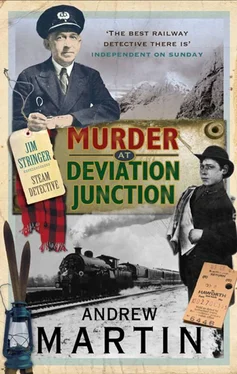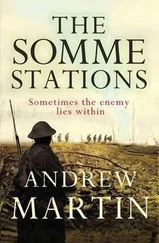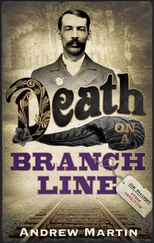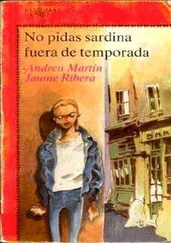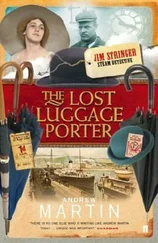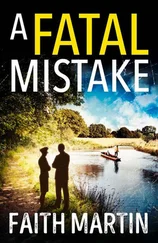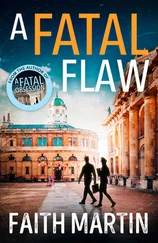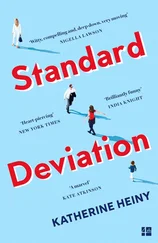'Well, this club was different,' said Mackenzie.
You'd have thought he was the Hon Sec or some such.
'Richer ,' he added, after a space. 'Membership never overtopped five.'
We were moving along the corridor again, passing two compartments. Inside they were like a rare sort of First Class accommodation: wood panelling with walnut trimmings, fancy electroliers bunched up into railway chandeliers. Photographic views were mounted in glass frames above each of the dozen seats - all the photographs showed country houses instead of the usual waterfalls or whatnot. One of the window panes was cracked, and there was a single bootprint on one of the seats.
Mackenzie was shaking his head as we pushed along the corridor. 'It was fitted on to the morning Whitby-Middlesbrough train,' he said. 'Came back with the evening Middlesbrough-Whitby.'
The corridor now brought us into a saloon: a railway sitting room with two settees facing each other under another brace of chandeliers. The seats had their backs to the windows. At either end were more chairs: two rockers facing a third sofa, and this one with a drop-head, for lying back.
'You'd have your glass of wine on your way home from business,' said Mackenzie, 'and you'd drink it stretched out flat! Bit of all right, wouldn't you say?'
'But only one of them could do that,' I said.
'All right if you were that one , then -'
'I just can't picture the sort of men who might have rode up here waiting on the platform at Whitby Town every morning,' I said.
'The train ran from Whitby,' he said. ' They didn't. Nobody who rode up here boarded at Whitby as far as I know. They lived at different spots further along the line.'
'Where?'
'Wherever a good house was to be found. Places around Saltburn.'
Stone Farm was near Saltburn. Was this a Club of murderers?
'They lived closer to Middlesbrough than to Whitby, then?'
He nodded.
'It's an hour and a half all the way from Whitby to Middlesbrough. You wouldn't want to do that every day.'
'They all rode every day?'
He nodded.
They were not gentry, then; not county people but businessmen. They could run to the smaller sorts of country houses. They'd have carriages and half a dozen servants apiece, but were still obliged to turn up daily at their place of business.
'Who put the Club together?'
'Search me. One of the members?'
'How come you know so much about the club yet can't put a name to any of the members?'
He let this go by, saying, 'The one who put the Club together would be the same bloke who put in for this carriage.'
'Did you ever set eyes on any of the Club people?'
'Don't reckon so. The carriage was always empty when it left here, remember.'
'What about Tom . . . whatsisname?'
'Coleman.'
'That's it - Whitby SM as was. Might it be worth writing to him in Cornwall?'
'You'd be writing to a dead man,' he said.
'When did he die?'
'This summer.' 'Of what?'
Mackenzie shrugged.
'Heart.'
He was enjoying this: the back and forth, like a game of tennis.
'Why did the Club have the two compartments and the saloon?'
He shrugged again, saying, 'Why do some folk have sitting rooms and parlours? Comes down to brass.'
The wind was getting up, and the carriage shivered for a moment like one of the boats in the harbour, but Mackenzie held his footing.
'Where are all the members of this Club?'
'All gone,' he said, grinning.
'Gone where?'
He was shaking his head vigorously now, as though trying to shake off the smile.
'That,' he said, 'is not known to any of the blokes along the line.'
PART TWO
The Gateshead Infant
Chapter Seven
The great tower of the cathedral, seen from the train, seemed to pin York to the ground. The city had been about for ever, and would go on in the same way. It was as cold as the coast but felt safer.
It was too safe, and the station police office seemed like a sort of prison - one building trapped inside another. It stood between Platform Four (the main down) and Platform Thirteen - a small bay platform used by trains from Hull and nowhere else. The Chief was in the office on my return from Bog Hall, along with two of the ten constables, Wright the chief clerk (who was also the only clerk) and Langbourne the charge sergeant. Detective Sergeant Shillito had not been present, which suited me, for it meant I could report direct to the Chief, who took one look at me and ordered me home for a day's sleep, this even though I had started in on the story of the dead body. Dead bodies were nothing to the Chief. He had killed men, and not just in war.
I did not go home directly, but sent a telegram and wrote a letter. I then biked home to Thorpe-on-Ouse, where I discovered that Harry had a low fever. There were so many medicine bottles by his bed that he would play soldiers with them - cod-liver oil, menthol, camphor - but none seemed to answer. Removal to a temperate climate was recommended for chronic bronchitis by the Home Doctor. Meanwhile in York, snow threatened, and I biked through an icy wind without gloves in order to book on at the office for Tuesday 14 December.
Present in the cold office at seven-thirty were Wright the chief clerk and two constables: Crawford, who was at Langbourne's desk, and Baker, who was by the fire. The constables didn't have desks, and the fact that I did was one of the few privileges that I, as a detective constable, had over them.
Wright, who was pushing seventy, was eating an orange prior to distributing the mail on to the desks. The orange was the only colourful item in the office, which was cold and smoky - dirty green in colour. No Christmas cards stood on the mantelpiece, nor were any likely to. A Hull train was simmering just beyond the door. Wright ate a few pieces of the orange very noisily. Everyone watched. After half a minute, he broke off, saying, 'I've got four of these oranges.'
It was like a threat.
'Four for a penny, they were,' he said.
'One for each of us, is it then?' enquired Baker.
'Eh?' said Wright, ripping at the fruit with his teeth.
'I can't stand oranges of any description,' said Crawford.
'What do you mean, "oranges of any description"?' asked Baker. 'All oranges are the same.'
'I hear you struck a dead body on your travels?' said Wright, who might have been old but was also very curious.
'I did,' I said.
'Reckon it was one of your murders?' he said.
The first case I'd taken on in the force had been a murder, and it seemed no one in the office had been able to get over the fact.
'I'm sure of it,' I said, and as I spoke the words, I wondered about them: yes, the connection of the death of Peters with the Travelling Club that had disappeared made the matter a certainty.
'All oranges are the same,' Baker said again.
'What about tangerines?' Crawford was saying.
'Tangerines are not oranges,' said Baker.
'They fucking well are,' said Crawford.
Wright, wiping his mouth with his mucky handkerchief, pointed to the swear box that sat on his desk, which was a shortcake tin with a hole stabbed through. Necessary swearing was permitted - swearing in the line of duty, so to speak - but Crawford's remark hardly counted.
Crawford ignored Wright, who looked at me again.
'Reckon you'll be permitted to investigate?' he said.
'It's up to the Chief,' I said.
Wright shook his ghostly old head, which was about two inches above the level of his desktop as he gnawed at the fruit. 'No,' he said. 'It's up to Shillito. He's your governor.'
'Tangerines are oranges,' said Crawford. 'That's what they're called: tangerine-oranges.'
Читать дальше
